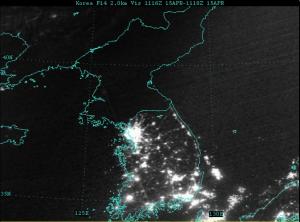Would revolutions and movements in North Africa and Middle East be able to fuel similar ones toward democracy in North Korea? After the fall of Hosni Mubarak, North Korea’s already harsh censorship has been intensified against the use of mobile phones to block any news about the topic. However, amid the growing grievances due to desperate food crisis, small-scale protests have burst out around the country recently. Part one will roundup what’s reported so far about North Korea in relation with the effects of the revolutions.

A nighttime satellite photo of the Korean peninsula, showing almost no sign of electricity provided in the North.
Source: DailyTech
Spreading and blocking the news; an ongoing battle
North Korean defectors and South Korean military have tried to send news to the North, including news of recent revolutions, by millions of air-drop leaflets. Such attempts became politically sensitive actions which attracted many criticisms, including worries that the action might lead to another bombing similar to the one that hit the Yeonpyeong Island last November. On 27th February, North Korea sent an official notification in the name of the North’s chief delegate to inter-Korean general-level military talks, warning that it would ‘fire aimed shots’ against ‘the spots of propaganda’(Source). North Korea was reported to not have broadcast anything about the revolution in Egypt until at least the 22nd of February.
North Korean defectors secretly distribute 'Stealth USB' to the North
New ways of spreading news have also been developed; members of the North Korean Intellectual Solidarity(NKIS), a group consisting of North Korean defectors living in South Korea, invented ‘Stealth USB’. Stealth USB is programmed to be presented as containing ‘0 byte’ of contents when it goes through the customs searches. After its set time elapses, contents are automatically activated.
According to NKIS, up to several hundred USBs have entered into the border. Alarmed by this, North Korean authorities are heavily scouring for them. Kim told that the group has already started to develop the version 2.0 to detour the intensified censorship.
North Korean Intellectual Solidarity has been established by Kim Hng-gwang. Kim is a well-known North Korean defector, who has worked as a dean of the Department of Computer Science in the North Korean Communist University. North Korean news carried out by his ‘secret correspondents’ mainly in China-North Korea border has been cited in numerous news media, including South Korean press and Japan’s NHK.
Kim said in an interview with Yonhap news agency in 23rd February that the members have been sent numbers of the USB secretly through their North Korean acquaintances. It contains various contents, ranging from political ones to South Korean soap operas. Kim said that the group is planning to send more with updated news on the revolution in Egypt and battles in Libya.
North Korea hit back with ever stronger censorship package
To prevent the flow of news, the North Korean regime has started to obstruct possible sources. It has stiffened censorship of the net and cell phone, outlawed lending cell phones to foreigners, and according to the South Korean National Intelligence Service on 6th March, Kim Jeong-il once deployed several tanks around his official residence for any possible emergency situation.
Theme by Danetsoft and Danang Probo Sayekti inspired by Maksimer